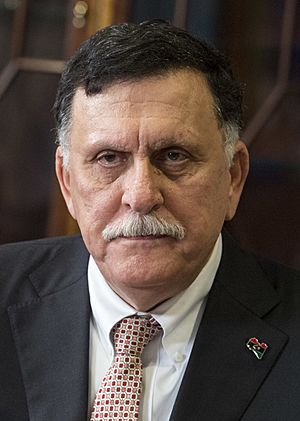Fayez al-Sarraj facts for kids
Quick facts for kids
Fayez al-Sarraj
|
|
|---|---|
| فايز السراج | |

Al-Sarraj in 2017
|
|
| Chairman of the Presidential Council of Libya (Government of National Accord) | |
| In office 30 March 2016 – 15 March 2021* |
|
| Prime Minister | Himself |
| Vice President | Ahmed Maiteeq |
| Preceded by | Nouri Abusahmain (As President of the General National Congress) Aguila Saleh Issa (As Speaker of the House of Representatives, internationally recognized) |
| Succeeded by | Mohamed al-Menfi (under the Government of National Unity) |
| Head of Government of Libya | |
|
As Chairman of the Presidential Council (Government of National Accord)
|
|
| In office 5 April 2016 – 15 March 2021** |
|
| President | Himself |
| Deputy | Ahmed Maiteeq |
| Preceded by | Abdullah al-Theni Khalifa al-Ghawil (As Prime Ministers) |
| Succeeded by | Abdul Hamid Dbeibeh (As Prime Minister under the Government of National Unity) |
| Minister of Defense | |
| In office 6 September 2018 – 29 August 2020 |
|
| President | Himself |
| Preceded by | Al-Mahdi Al-Barghathi |
| Succeeded by | Salah Eddine al-Namrouch |
| Minister of Housing and Utilities | |
| In office 25 May 2014 – 9 June 2014 |
|
| President | Nouri Abusahmain |
| Prime Minister | Ahmed Maiteeq |
| Preceded by | Ali Al-Sharif |
| Succeeded by | Zuhair Mahmoud |
| Personal details | |
| Born |
Fayez Mustafa al-Sarraj
20 February 1960 Tripoli, Kingdom of Libya |
| Citizenship | Libya |
| Political party | Independent |
| Spouses |
|
| Signature |  |
| *Sarraj's position as head of state was disputed by Aguila Saleh Issa. **Sarraj's premiership was disputed by Abdullah al-Theni and Khalifa al-Ghawil. |
|
Fayez Mustafa al-Sarraj (born 20 February 1960) is a Libyan politician. He served as the leader of Libya's Government of National Accord (GNA) from 2016 to 2021. This government was created to bring peace and unity to Libya. He was the Chairman of the Presidential Council and also the head of government.
Contents
Early Life and Career
Fayez Mustafa al-Sarraj was born in Tripoli on February 20, 1960. He came from a well-known family. His father, Mostafa al-Sarraj, was a minister during the time when Libya was a kingdom. Fayez al-Sarraj studied to become an architect. During the time of Muammar Gaddafi, he worked for the Housing Ministry. In 2014, he became the Minister of Housing and Utilities.
After elections in Libya in 2014, the country's government split into two main groups. One group was in Tripoli, and the other, recognized by many countries, was in Tobruk.
Leading the Government of National Accord
In October 2014, the United Nations (UN) tried to help Libya form a single, united government. They suggested a new government led by a Presidential Council, with Fayez al-Sarraj as its prime minister. This new government was called the Government of National Accord (GNA).
On March 30, 2016, Fayez al-Sarraj and other members of the Presidential Council arrived in Tripoli. The GNA then took control of the prime minister's offices. This was a big step towards uniting the country.

Challenges and Efforts
Even after the GNA was formed, it faced many challenges. It was difficult for the government to gain full control and be seen as the main authority across the country. Libya remained divided, and there were often conflicts between different groups.
The GNA also struggled with economic problems. Libyan citizens faced issues like rising prices and corruption. The United Nations, which helped create the GNA, later expressed concerns that the government was not making enough progress. They noted that the GNA had "limited authority" and that its plans had "stalled."
In 2017, there were discussions about changing the structure of the GNA to make it more effective. Fayez al-Sarraj worked to address these issues and bring stability to Libya.
End of His Term
On September 16, 2020, Fayez al-Sarraj announced that he would step down from his position. He officially transferred his powers on March 15, 2021, marking the end of his time as the leader of the Government of National Accord.
See also
 In Spanish: Fayez al Sarraj para niños
In Spanish: Fayez al Sarraj para niños
 | Roy Wilkins |
 | John Lewis |
 | Linda Carol Brown |

